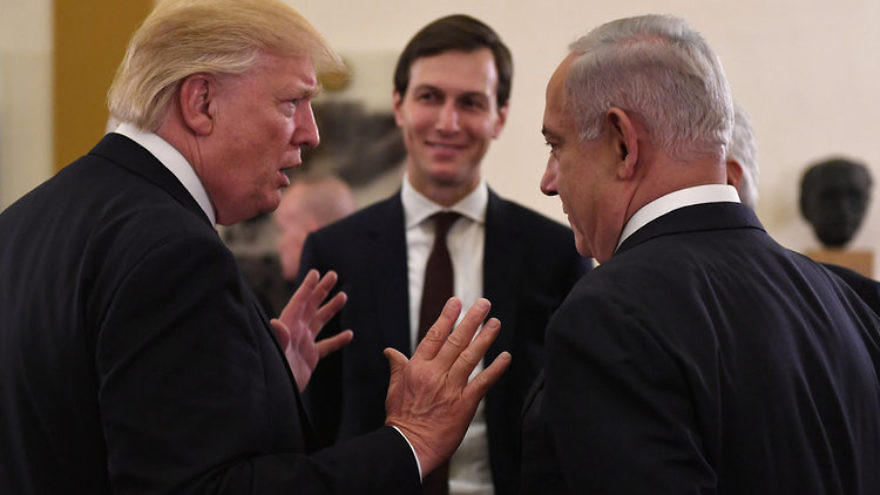 Kobi Gideon/Israeli Government Press Office
Kobi Gideon/Israeli Government Press Office
The Palestinians boycotted Kushner's exercise, having made it plain that they will refuse any American offer of financial aid without agreement for a Palestinian state. The Trump administration has no intention of doing that. Indeed, the Bahrain conference was designed to elicit a Palestinian rejection, at which point the U.S. can give Israel the go-ahead for its plans to annex parts of the West Bank and permanently thwart Palestinian statehood.
While the Bahrain show played out, the real Deal of the Century was being discussed in Jerusalem, by the national security advisers of the U.S., Russia and Israel. Ostensibly the Jerusalem conference was convened to discuss the situation in Syria and Iran's role there. But its tacit agenda was broader.
It is part of a process in which the U.S. and Russia are attempting to divide the Middle East into spheres of influence. It has come about because the West's two superpowers have interests in the region that seem best served by cooperation.
There are certainly grounds for a deal. Russia already dominates Syria and would like to stay there permanently. The U.S. has no aspirations there beyond keeping the peace and protecting Israel. This shouldn't be hard for Russia to agree to.
"We pay special attention to ensuring Israel's security," Nikolai Patrushev, Secretary of Russia's Security Council, said in a meeting with Israeli Prime Minister Benjamin Netanyahu. "It is a special interest of ours because here, in Israel, live about two million of our countrymen." That's a good start.
A long-term Russian presence in Damascus would automatically give it a bigger role in the region. Lebanon is an extension of Syria. And Iraq, already fractured, lends itself to easy division, between the Kurdish pro-American north and the rest of the country. These nations, left to their own devices, have produced leaders like Saddam Hussein, the Assad family, Hezbollah's Sheikh Hassan Nasrallah and ISIS chief Abu Bakr al-Baghdadi.
In a new order, Russia would agree to refrain from dabbling in the affairs of U.S. dependents, like Egypt (which has recently been flirting with Moscow) or Jordan. It would also stop trying to sell Turkey advanced weapons systems (the U.S. is fighting to block the sale of Russian S-400 missile system to Turkey).
And Moscow would stand aside as the U.S. puts together a coalition to counter Iranian aggression in the Gulf. Secretary of State Mike Pompeo is in Saudi Arabia this week, shoring up that project. If it leads to the overthrow of the current regime in Iran (an aim which Trump denies), Russia could expect to share influence there.
An American-Russian understanding in the Middle East will require diplomacy beyond the region. National Security Advisor John Bolton made this clear after his first meeting in Jerusalem with his Russian counterpart, Patrushev. "We and our teams covered Ukraine, arms control, Venezuela and other issues," Bolton tweeted.
These are some of the potential bargaining chips. Venezuela, where Russia has been active recently, falls under the Monroe Doctrine that asserts U.S. primacy in the Western Hemisphere. The U.S. also opposes Russian territorial claims in Crimea and the eastern part of Ukraine.
Around this table, Israel serves as a broker between Putin and Trump. This is a role Netanyahu has cultivated for more than two years. His goal is to make sure that any regional deal fits Israel's interests. These include permanent security control over the West Bank and sovereignty over Jerusalem (the tripartite meeting itself is a step in that direction), coordination with Russia on its military presence in Syria, and continued American pressure on Iran.
After World War I, the victors - Great Britain and France - divvied up the Ottoman Empire's holdings in the Middle East. A hundred years later, the circumstances and the big powers are different, but the principle is the same. The region is too important to leave to fanatic, unstable or failed regimes. A new order, under joint U.S.-Russian auspices, is desirable if it can be agreed upon. That's what was really being explored in Jerusalem. Bahrain was just a sideshow.
Every weekday JewishWorldReview.com publishes what many in the media and Washington consider "must-reading". Sign up for the daily JWR update. It's free. Just click here.
(COMMENT, BELOW)
Previously:
• 03/04/19: Bibi Netanyahu will never go quietly
• 02/25/19: New Med-East forum is about more than just gas
• 02/08/19: Why Viktor Orban will get a warm welcome in Jerusalem
• 01/11/19: Troop withdrawal from Syria has started. The real reasons why Netanyahu isn't worried
• 12/14/18: Bye, Bye, Bibi?
• 10/22/18: Why Netanyahu called off a war in Gaza
• 07/23/18: We can -- and should -- drink to that: Pepsico's buying SodaStream sends a resounding message
• 08/08/18: Israel's Left bit Bibi's bait --- yet again
• 07/23/18: Why Israel got the biggest win from Helsinki
• 06/27/18: Trump's new deal for the Middle East
• 06/04/18: Israel's Golan annexation deserves US recognition
• 04/20/18: Israel's survival through iron will and an iron wall
• 04/03/18: Israeli voters help Netanyahu defuse ethics inquiry
• 02/28/18: How Billy Graham made Israel kosher to evangelicals
• 02/07/18: Israel's immigration crisis is a lesson for Trump
• 01/29/18: What Pence's 'worthless' trip reveals
• 11/27/17: Look to Israel for a playbook on dealing with North Korea
• 11/27/17: Why Israel will dictate any terms of a 'peace deal'. And why the 'Palestinians' will have no choice but to accept them
Chafets is a journalist and author of 14 books. He was a senior aide to Israeli Prime Minister Menachem Begin and the founding managing editor of the Jerusalem Report Magazine.


 Contact The Editor
Contact The Editor
 Articles By This Author
Articles By This Author